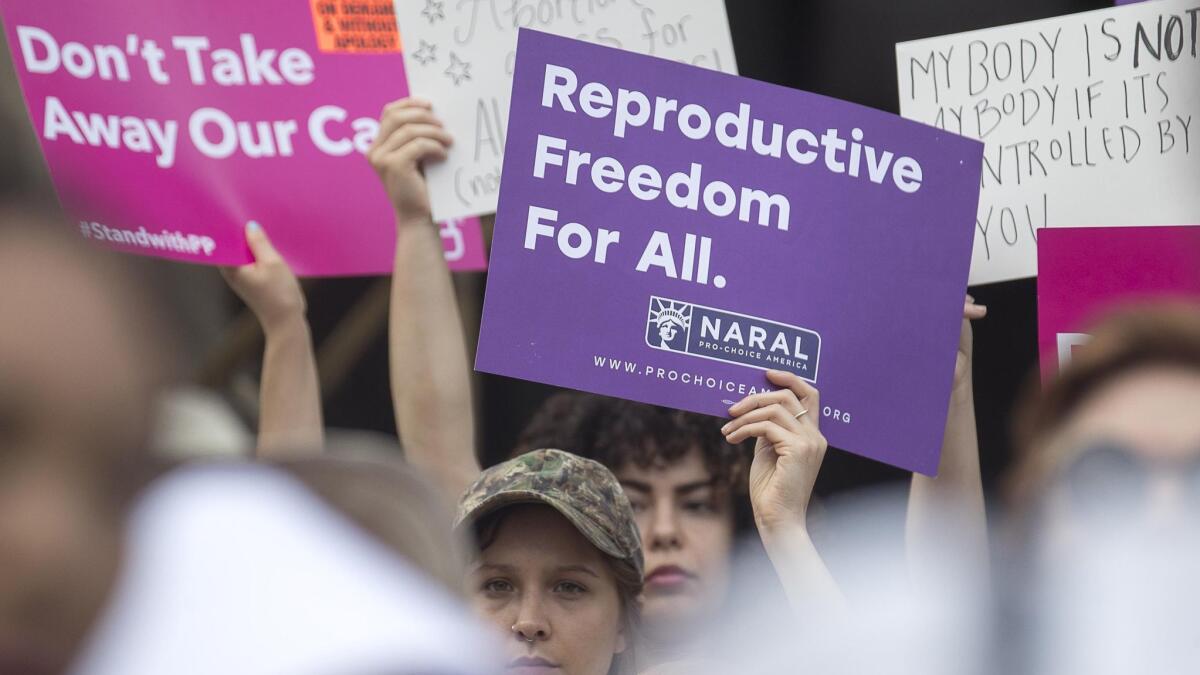Column: Hollywood throws women under the bus by keeping silent on Georgia abortion law

Given the unexampled malevolence of Georgia’s new anti-abortion law, you might think that the film industry, that hive of progressive social activism, would be among the leaders in taking action against the state.
After all, the threat of production boycotts helped stave off an anti-LGBTQ measure promoted by the state’s troglodytic political leadership in 2016. Since Georgia is one of the top-ranked film and TV production centers in the country, along with California and New York, a concerted response might have persuaded the state to think twice about this law.
Sadly, no. As my colleague Ryan Faughnder reported Friday, the Hollywood studios have largely been mum about the the abortion law. They’ve outsourced their response to their PR arm, the Motion Picture Assn. of America, which issued a weaselly statement Wednesday, a day after Gov. Brian Kemp signed the law, saying that it would “continue to monitor developments.” Nothing since then.
Pledge with me not to film anything in Georgia until they reverse this backwards legislation.
— Actor-producer Mark Duplass
We’ll get to the horrific features of the law in a moment. First, there’s no mystery about why the studios are keeping mum: They’ve been bought off.
Georgia offers tax credits worth up to 30% of in-state production spending, an incentive that was worth $800 million to the film industry in 2017, according to research from FilmL.A. Whether the incentive paid for itself is unknown; according to the Pew Charitable Trust, the state has no procedure for determining whether it gains more in economic growth than it spends.
But plainly its spending has bought Hollywood’s silence. Only a handful of independent producers have spoken out against the abortion law. They include David Simon, best known as the creator of “The Wire,” who tweeted this week, “I can’t ask any female member of any film production with which I am involved to...compromise their inalienable authority over their own bodies” and pledged to work only where “the rights of all citizens remain intact.”
Actor-director-producer Mark Duplass called on his industry colleagues by tweet to “pledge with me not to film anything in Georgia until they reverse this backwards legislation.” Alyssa Milano, who was a leader of the 50 actors who signed an open letter to Kemp in March urging him not to sign the law — Alec Baldwin, Christina Applegate and Sean Penn among them — said this week that she wouldn’t return to the Netflix show “Insatiable” if it continues filming in Georgia.
That brings us to the abortion law itself. Georgia’s measure is the most restrictive in the nation, effectively banning abortions after six weeks of pregnancy, a point at which many women don’t even know they’re pregnant. The law states covers cases in which a fetal heartbeat can be detected; medical science say that whatever pulses can be heard at six weeks are merely electrical activity, since a heart hasn’t been formed yet.
Anyone who terminates a pregnancy at six weeks could be exposed to a murder charge and the death penalty under the Georgia law, including doctors. The law even applies to women who travel out of state for abortions or anyone who helps them do so — that could be interpreted as conspiracy to murder.
Women who miscarry are also subject to murder charges, if a prosecutor determines that the miscarriage is their fault. As Mark Joseph Stern of Slate observes, “prosecutors may interrogate women who miscarry to determine whether they can be held responsible; if they find evidence of culpability, they may charge, detain, and try these women for the death of their fetuses.”
This is the law on which establishment Hollywood chooses to remain silent. (My colleague Mary McNamara also lets them have it with both barrels.)
The MPAA’s commitment to “monitor developments” won’t do. Let’s be clear: There’s nothing left to monitor. The MPAA tries to downplay the gravity of Georgia’s offense against women’s reproductive rights by pointing out that “similar legislation has been attempted in other states, and has either been enjoined by the courts or currently being challenged. The outcome in Georgia will also be determined through the legal process.”
It’s hard to imagine a more craven stance. Georgia passed this law overtly to invite a court ruling, figuring that an increasingly reactionary Supreme Court will use it, and other state laws like it, to overturn Roe vs. Wade, the 1973 landmark decision declaring abortion restrictions unconstitutional.
Silence on this scale is the enemy of women’s rights. Silence from the Hollywood community encouraged Georgia to pass the law in the first place, and silence will fortify the courts’ willingness to wave it through.
What the studios don’t seem to understand is that their compact with Georgia cuts both ways. They collect hundreds of millions of dollars in tax breaks, but Georgia gets jobs, bragging rights and glitter in return. Had the studios said that it wouldn’t be worth their souls to stand by with their mouths shut as the state trampled on women’s rights, the betting here is that this law would not have happened.
In 2016, Time Warner, Disney, Viacom and AMC protested Georgia’s proposed Free Exercise Protection Act, which would have given legal cover to LGBTQ discrimination. They stopped that bill in its tracks. Are they condoning this law because the tax payoffs in Georgia are bigger now than they were in 2016, or because to the film industry, women just don’t count?
Keep up to date with Michael Hiltzik. Follow @hiltzikm on Twitter, see his Facebook page, or email michael.hiltzik@latimes.com.
Return to Michael Hiltzik’s blog.
More to Read
The biggest entertainment stories
Get our big stories about Hollywood, film, television, music, arts, culture and more right in your inbox as soon as they publish.
You may occasionally receive promotional content from the Los Angeles Times.







